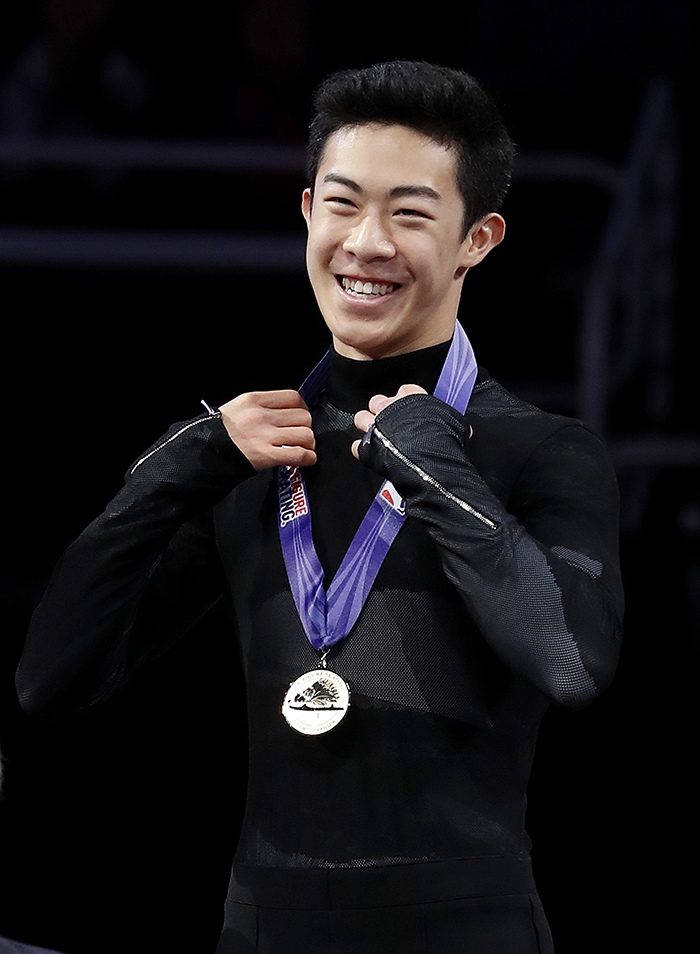By DAVE SKRETTA
AP Sports Writer

Nathan Chen (Photo by Tony Avelar/AP)
GANGNEUNG, South Korea (AP) — Nathan Chen finally admitted the pressure of being the face of American figure skating got to him, winding him up so tight for his short program that it ended in what he described as a “disaster.”
All that pressure was gone for his free skate.
Out of medals contention and finally skating with a clear mind, the 18-year-old prodigy landed an unparalleled six quadruple jumps in a historic performance at the Pyeongchang Olympics. His personal-best score of 215.08 points on Feb. 17 was more than enough to win the free skate, and helped move up to fifth place. Yuzuru Hanyu and Shoma Uno took the gold and the silver medals for Japan.
“As much as I tried to deny it, I think I did feel the pressure a lot, thinking about medals and placement and things like that, things that were entirely out of my control,” Chen explained. “That just tightened me up, made me really cautious on the ice, and that’s not the way to skate.”
Chen had been the best American hope for a figure skating gold medal at the Winter Games, becoming the face of not only U.S. Figure Skating but ad campaigns for numerous Olympic sponsors. His coy smile, youthful exuberance and uncanny ability to land the hardest four-revolution jumps in the sport made for an ideal marketing package of substance and charm.
That also put tremendous demands on his time.
Photo shoots. Interview requests. The constant attention and adoration that comes with the hopes of an entire nation resting on your shoulders. It all became a little much for him to handle.
That became evident when Chen struggled through his short program as part of the team event, which still helped the U.S. win the bronze medal. And it was on full display Friday, when he failed to land a single clean jump in the individual competition and fell to 17th out of the 24 skaters to advance.
Chen joked that he would have gone straight to the practice ice if there was any availability, but instead he retired to his room. He lay on his bed and allowed his mind to go blank, save for the almost preposterous of idea of trying to shoehorn that sixth quad into his program.
“I think after having such a disastrous short program and being so, so low in the ranking — lower than I usually ever am — it allowed me to completely forget the results and focus on enjoying myself out on the ice,” Chen said, “and getting rid of expectations helped a lot.”
Performing to “Mao’s Last Dancer,” the two-time U.S. champion ripped off a quad lutz to start his program, then landed a quad flip-double toe combination before another quad flip.
That third one was originally supposed to be a triple loop.
After achieving level-four ratings on his spin and step sequence, the high-flying Chen landed a massive quad toe-triple toe combination before another quad toe and a quad salchow.
That’s six quads in four variations, something never before accomplished in any competition.
“I had changed the short program, the second flip to a toe, and that was just a mistake,” Chen said, recalling his conservative approach to the start of his Olympic program. “I told myself I wasn’t going to play it safe today and if I make a couple mistakes, so be it.”
Chen wasn’t done with his aerial acrobatics after the quads, either. He landed the very difficult triple axel, which is worth nearly as much as a quad flip, and a triple flip-single loop-triple salchow combination that had a crowd smattered with American fans roaring in approval.
He was relatively composed as his music stopped, refusing to let out a triumphant roar like many other skaters. He calmly skated off the ice to the rapturous applause, only letting out a bashful grin when he sat beside his coach, Rafael Arutunian, and awaited his scores.
Chen finally smiled when his numbers were read.
“Just a mix of emotions,” he said. “Immediately just like, happy that I did what I did, and then kind of upset that I did what I did with such a bad short program. It doesn’t quite balance out. It was a bunch of emotions, but I’m really happy with what I did today.”



